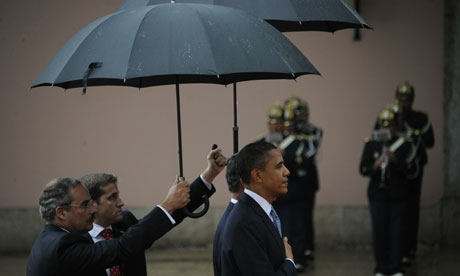‘Fit for purpose’ Nato looks to Russia for help with missile defence shield
by editor | 2010-11-20 9:13 am
![]()
Mission statement takes in nuclear weapons and Turkey
Alliance to co-operate with Russia on missile defence
Ian Traynor

Nato has declared itself “fit for purpose” for at least another decade, adopting a mission statement at its summit in Lisbon that bridged arguments on nuclear disarmament, missile defence, Turkey’s relations with Europe, and offered Russia a “true strategic partnership”.
The leaders of Nato’s 28 member states also pledged last night to work towards a nuclear-free world, in line with Barack Obama’s announcement in Prague last year, but stressed that “as long as there are nuclear weapons in the world, Nato will remain a nuclear alliance”.
The military alliance’s “strategic concept”, drafted over the past 18 months, highlighted fresh threats – from cyber warfare to energy security and conflicts on environmental and natural resources, warning that the spread of weapons of mass destruction entailed “incalculable consequences”. The 11-page document said: “During the next decade, proliferation will be most acute in some of the world’s most volatile regions.”
Nicolas Sarkozy, the French president, told the summit that Paris would never give up its “force de frappe” nuclear option in response to a dispute between Germany and France over nuclear deterrence; Berlin is pushing for more explicit commitments to ditching nuclear weapons.
While the summit sought to prepare the ground for a gradual fusion of Nato and European Union security policy, Turkey dug in its heels, blocking any breakthrough in collaboration between the two organisations. “The text falls short for us,” Abdullah Gül, the Turkish president, told the summit, which reflected Ankara’s anger with the snail’s pace of its negotiations to join the EU. “We’re pleased except for the paragraph on Nato and the EU.”
The alliance said it would develop a new missile shield to protect Europe and North America against potential ballistic rocket attacks from countries such as Iran, Syria or North Korea. “We will actively seek co-operation on missile defence with Russia,” the document added.
But Obama and European leaders were still wrestling last night over the detail of the missile shield pact. Officials said that several European leaders appeared to be stepping back at the last minute, worried that the cost could spiral at a time of defence cuts across Europe. “The costs could be a showstopper,” said a Nato official. “The Americans could come back later and present the bill. Some leaders want real assurances on that.”
Anders Fogh Rasmussen, Nato’s secretary general, said the project was affordable. His spokesman, James Appathurai, said the price would be less than €1bn.
But that optimism was not shared by several European governments. One foreign minister told the Guardian: “This must not be pre-cooked. There are big questions about the costs. We have to be transparent about what it might mean in the future. And we have to insist that Russia does not see it as a threat.” Nonetheless agreement was expected late last night, paving the way for a pact with Russia today when President Dmitry Medvedev arrives for his first summit with Nato leaders since Moscow invaded Georgia more than two years ago.
The Kremlin and western capitals appear poised to embark on a range of joint security, political, and military projects aimed at closing the worst period of friction since the cold war. Obama announced last year that he wanted to “reset” relations with Russia and he is likely to reinforce relations with Moscow while also boosting Medvedev in his brewing domestic political contest with Vladimir Putin.
Tentative agreement is expected today on prospects for the missile shield. Rasmussen said: “By reaching out and inviting Russia to co-operate with us, I believe we have a real chance to build a security roof for the entire Euro-Atlantic area.”
Those overtures to Moscow were echoed by other leaders. “I wish for Russia to be as involved as possible,’ said Angela Merkel, the German chancellor.
“This is the start of a new phase of co-operation between Nato and Russia,” said a Downing Street spokeswoman; relations between London and Moscow have been particularly fraught over the past couple of years.
Russia and the west are expected to agree on a range of other policies and projects today, from Afghanistan to joint analysis of future security threats.
The Russians have agreed to expand Nato supply routes to and from Afghanistan, to service Afghan helicopters, train Afghan pilots, and conduct joint programmes with the west aimed at countering the Afghan heroin trade.
Despite wariness in eastern Europe at the new warmth between Moscow and the west, Nato officials were confident that Medvedev was investing much capital in the relationship, while also improving his chances of prevailing in a likely contest with Putin, his mentor and potential rival. It remains to be seen, however, whether Obama, weakened by Republican victories in the US mid-term elections, will be able to deliver ratification of the new Start nuclear arms reduction treaty between the US and Russia. If he fails, relations with Moscow are likely to be set back.
Source URL: https://globalrights.info/2010/11/fit-for-purpose-nato-looks-to-russia-for-help-with-missile-defence-shield/